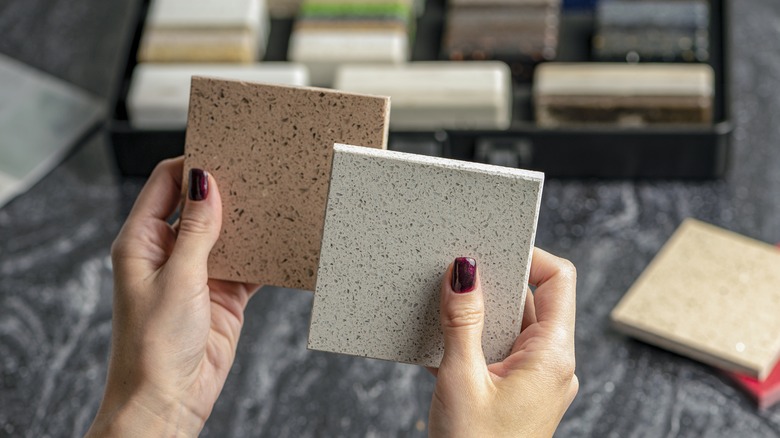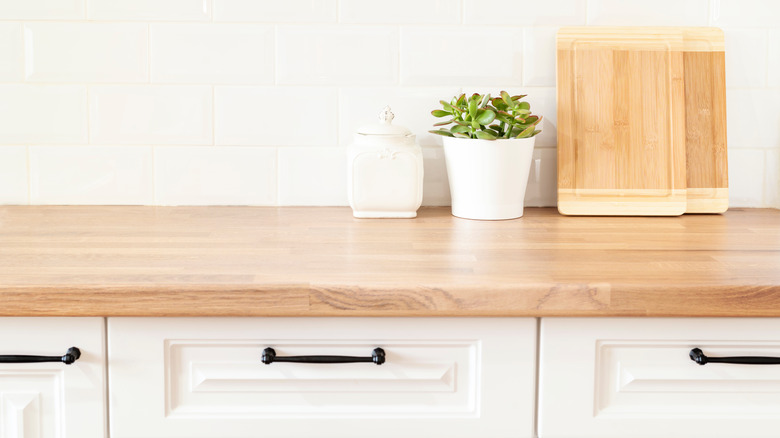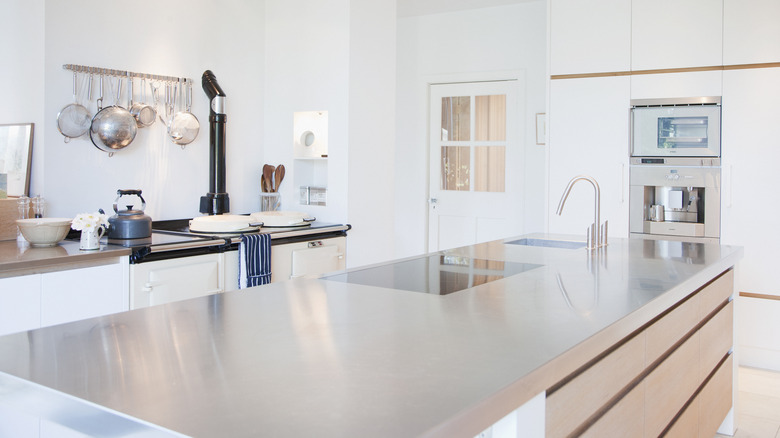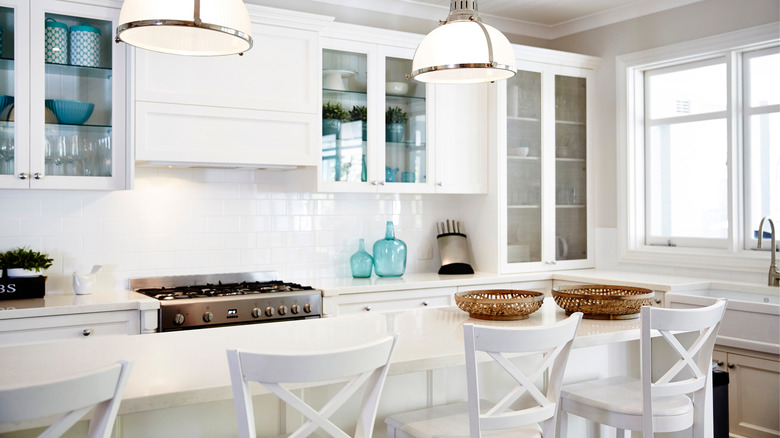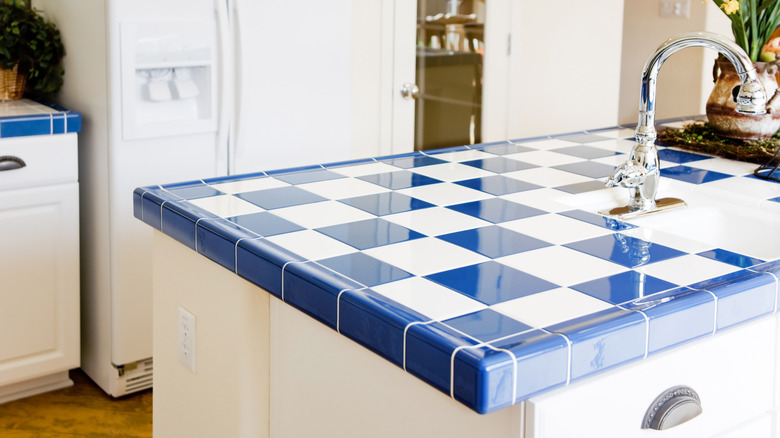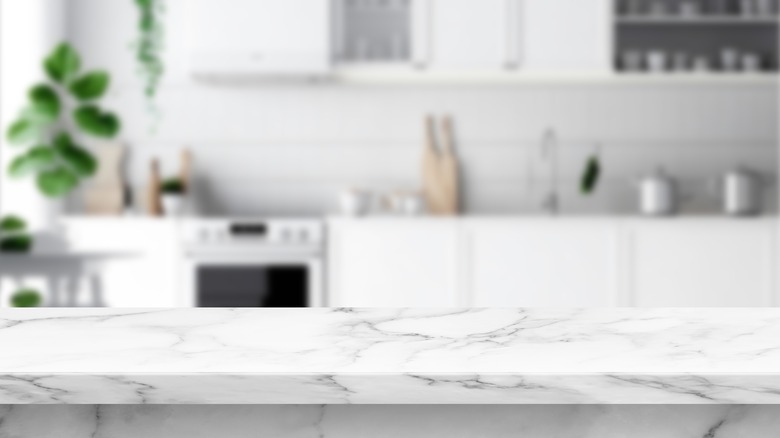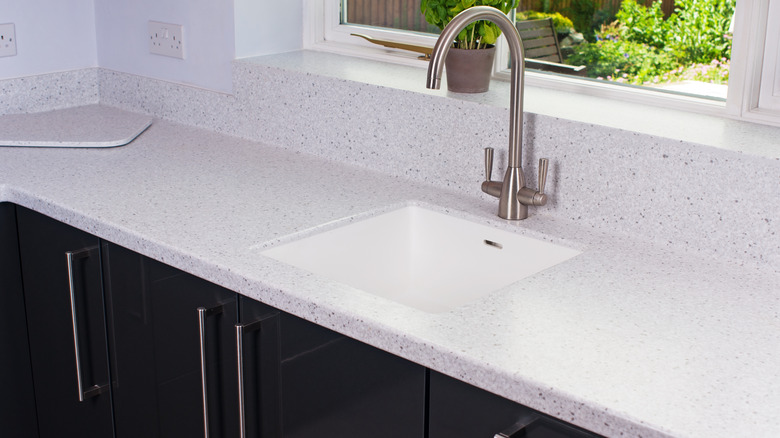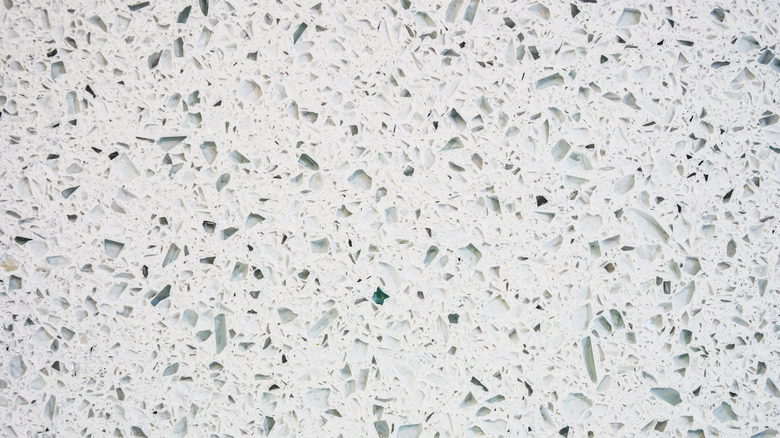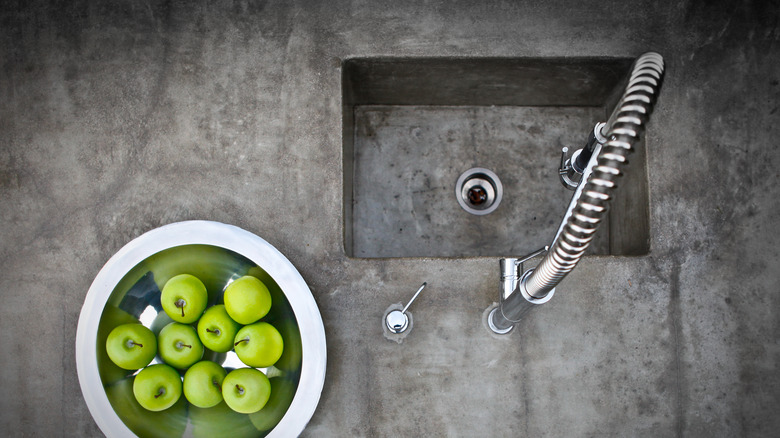Beautiful Countertops That Look Great In Coastal Kitchens (And Ones To Avoid)
Your choice of countertop can change the atmosphere of your kitchen dramatically. The many types of kitchen countertops and endless color choices can overwhelm even the most decisive homeowner. And since countertops cover a lot of surface area in the kitchen, it's important to choose the color and material carefully to ensure your desired aesthetic is achieved.
Whether you have a seaside cottage or you're simply a beach decor lover, making your kitchen a coastal dream is a matter of choosing the right material and palette for your countertop that keeps the aesthetic light and fresh. Whether you choose to stick to marine-influenced hues of white and blue or prefer a modern, neutral kitchen, your countertop can make the difference between a heavy kitchen and an airy cooking space. Check out the best countertop options for your coastal kitchen (and ones to avoid).
Butcher block countertops: For a warm, inviting beachy vibe
A butcher block countertop never goes out of style — especially in a coastal kitchen. This classic option is timeless because it brings the outdoors in, which is key to achieving a beach-inspired look. Butcher block countertops are known for their warm, inviting aesthetic, which creates a casual atmosphere akin to a beach house. There various cuts, like end grain, edge grain, and face grain to create the look you are striving for. For a coastal kitchen, opt for a light hue of wood, such as beech or maple, which will keep the room bright and airy. Avoid dark stains and naturally darker woods, like walnut and cherry.
Butcher block is not only easy on the eyes, but also on the wallet. It's a cheaper option than any stone countertop, including quartz or granite. Prices can increase according to your choices, such as if you want an end grain checkerboard pattern or a specialty wood, but simple is often better in a coastal kitchen.
Stainless steel: A sterile countertop that won't work in a coastal space
Stainless steel countertops are most often found in professional kitchens but are a favorite among homeowners for curating an industrial aesthetic. While this utilitarian choice of countertop no doubt adds an air of sophistication and minimalism, it tends to clash with the coastal style. You can achieve a beachy look in your kitchen with colors and materials resembling natural elements, like sand and stone: not with the cool tone and sterility of stainless steel.
On a practical note, other downsides of stainless steel countertops include their cost and maintenance. They tend to run up the bill, even more so than granite. Plus, these countertops are all about function, not frills. Stainless steel is undeniably durable, which is why they're found in high-use professional kitchens, but it's near impossible to keep them looking presentable. You'll notice every fingerprint and water stain.
Solid surface: For easy-to-clean coastal kitchen counters
Solid surface countertops are a popular choice, and it's not hard to see why. They're affordable, easy to install and maintain, and aesthetically versatile. This is an engineered material made from mineral dust derived from marble, mixed with a rainbow of pigment options. You can also add texture to your solid surface countertop, including veinong. Combined with solid surface's seamless look, you can have a countertop resembling granite for a fraction of the price. Otherwise, there are plenty of muted neutrals to choose from that would all look perfect in your coastal kitchen.
Your beachy kitchen should be relaxing, and the ease and low cost of buying solid surface countertops can help you keep your peace. And unlike some other countertop options, this choice's installation can be DIYed, which can save you hundreds of dollars. You also don't need to stress about maintenance and repairs. It's true that, being plastic, solid surface is susceptible to heat and scratching. However, it's a forgiving material that can be easily and quickly fixed on your own, no major DIY skills needed.
Ceramic tiles: A high-maintenance countertop option to avoid
Tiled countertops are an easy way to have a truly original surface, especially if you like patterns and texture. However, ceramic tiles aren't always the best fit in a coastal kitchen. This is especially true for modern, glossy, or geometric-patterned tiles, which work against the relaxed, natural vibe of a beachy kitchen. In general, contrasting patterns can quickly overwhelm the light and airy aesthetic you're trying to strike.
Also, tiled countertops come with functional downsides. Their daily cleaning needs and long-term maintenance requirements can turn into a hassle. Grout looks dirty quickly and stains brown easily, requiring regular wipe-ups and routine sealing as the material naturally wears down. The upkeep is an especially important consideration to make if your coastal kitchen is near the beach, where sand and dirt are more regularly tracked in.
Quartz: For a reliable and versatile coastal kitchen countertop
Quartz is an incredibly durable countertop that comes in beautiful colors and patterns. These range from soft browns with nature-inspired patterns to brilliant whites that mimic marble. A quartz countertop with the look of natural stone in soft tones of sand, blue, or grey would be a perfect fit in your coastal-inspired kitchen.
The material can give an elevated yet practical touch to your kitchen as these countertops are human-made with durability in mind. Not only does this option make for a stunning countertop, but its non-porous surface is ideal for those seeking minimal maintenance. Resistant to scratches, heat, and stains, quartz countertops have the strength of concrete without the demanding upkeep that comes with it or any natural stone material. In terms of investment, quartz countertops fall somewhere in the middle of all countertop option prices. Quartz is often comparable to granite in price but is more expensive than concrete or laminate countertops.
Laminate: A material to steer clear of if you want a beachy look
Homeowners on a stringent budget often opt for laminate countertops for many of the same reasons you might go for a solid surface countertop. They're usually the cheapest material on the market, they're not difficult to DIY, and they're available in many colors and patterns. Despite their pros, laminate countertops tend to look out of place in coastal kitchens. Even to the naked eye, they're easily distinguishable as artificial and plastic-like, which isn't desirable in a natural, beach-inspired kitchen. And while patterned counters can work for some aesthetics, a busy laminate pattern with lots of contrast looks heavy and chaotic in a coastal kitchen.
While it's true that laminate is the most economical countertop material, it can lower your property value and thus should be avoided, according to Jonathan Scott from the Property Brothers. You might still consider laminate for its relatively easy upkeep, but note that the material is not heat-resistant and can scratch, similar to solid surface. But solid surface can be easily repaired, whereas with laminate, if a repair kit doesn't do the trick, you might need to replace it completely. Also, if your coastal kitchen is in a beachy area, be warned that laminate countertops do not do well in high-humidity areas. While the surface itself is waterproof, the seams can allow moisture to seep in, creating unattractive swelling and peeling.
Recycled glass: Countertops for an eco-friendly coastal kitchen
If sustainability is important in your search for the best coastal-theme kitchen counter, recycled glass is a fantastic choice. Who knew that glass from a used bottle or a car's windshield could create such a beautiful recycled material? This unique countertop option is created by combining crushed glass waste with a binder, such as a type of resin, like acrylic, or cement. Traditional, plastic-based resin is more durable and easier to clean than a porous concrete-based mix. Regardless of the binder, a recycled glass countertop is more sustainably-minded than a countertop made of a non-renewable resource, as is the case for marble and granite.
Recycled glass countertops are not only eco-friendly and low maintenance, but they're exceptionally beautiful and well-suited for a seaside or beach-inspired home. The crushed glass evokes images of sea glass scattered along the shore. While there are limitless options for recycled glass colors, opt for subtle green and blue hues for a classic beachy look in your coastal kitchen.
Concrete: A cold surface that will bring down airy vibes
Concrete is a popular kitchen counter material for a couple of reasons. First, it's an incredibly customizable material. There are limitless stain options that can give a concrete countertop any number of color and pattern options. However, the concrete colors are darker in pigment than you may want for a fresh coastal kitchen. But if you do like the concrete look, there are several quartz options that mimic the look of concrete.
Concrete is often chosen for kitchen counters due to its strength and durability. But despite its durable structure, concrete kitchen counters can start appearing shabby quickly. One of the main things you should know before you buy concrete countertops is that they need routine maintenance and even daily work, which you may not want to keep up with. Because concrete is highly porous, any spill or mess must be cleaned up quickly to avoid seeping into the material and creating stains that are difficult to remove. Additionally, concrete countertops require regular resealing — once or twice a year is a general rule of thumb.
